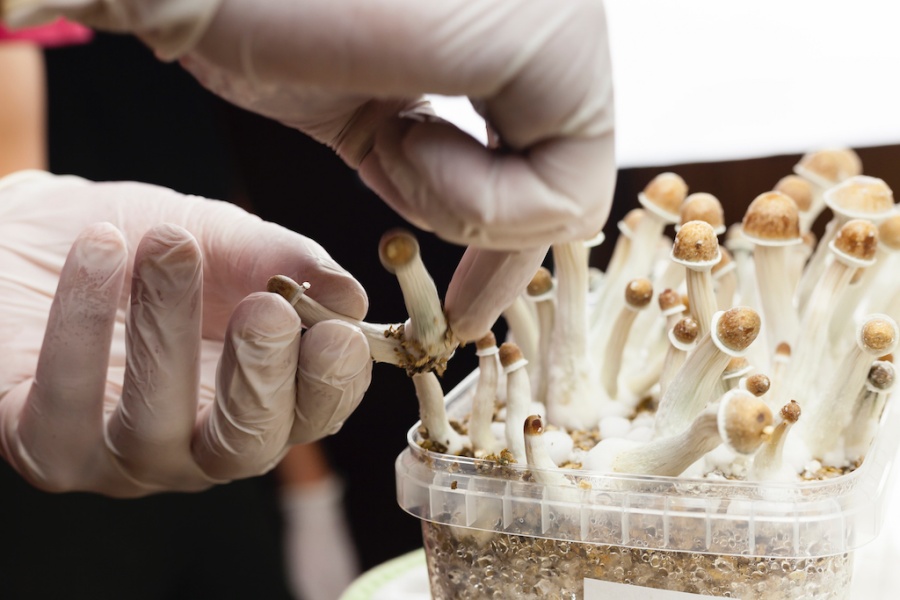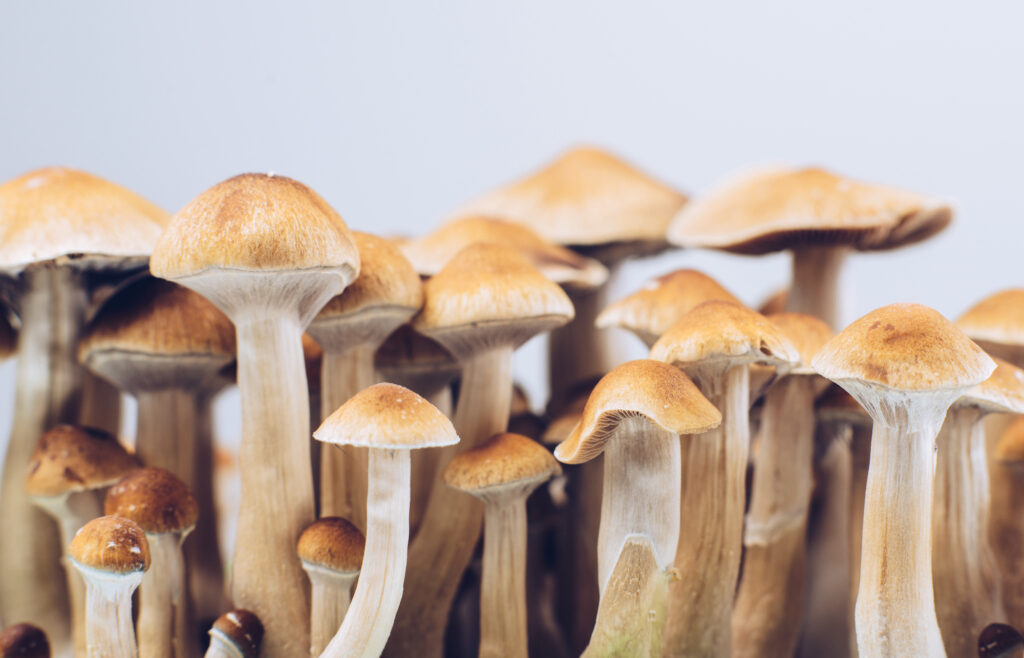Introduction
In recent years, the therapeutic potential of magic mushrooms, scientifically known as psilocybin mushrooms, has garnered significant attention in the field of mental health. These mushrooms, traditionally used in indigenous rituals for their psychoactive properties, are now being studied for their profound effects on various mental health conditions. This blog explores the therapeutic benefits of magic mushrooms, their impact on mental well-being, and the current state of research in this fascinating field.
MORE:- Magic mushrooms for brain
Understanding Magic Mushrooms: What are Psilocybin Mushrooms?
Which are responsible for their mind-altering effects.

1. Origins and Cultural Significance
Psilocybin mushrooms have a rich history dating back thousands of years, with evidence of their use in religious and spiritual ceremonies by indigenous cultures across the globe. The mushrooms contain psychoactive compounds such as psilocybin and psilocin, which are responsible for their mind-altering effects.
2. How Psilocybin Works in the Brain
Psilocybin interacts primarily with serotonin receptors in the brain, particularly the 5-HT2A receptors. This interaction leads to altered perception, cognition, and mood, often described as a heightened state of consciousness or “expanded mind.”
Therapeutic Potential of Magic Mushrooms
Often accompanied by psychotherapy.
1. Treating Depression and Anxiety Disorders
– Clinical Studies and Findings
Recent clinical trials have shown promising results in using psilocybin-assisted therapy for treatment-resistant depression (TRD) and severe anxiety disorders. Patients report reduced symptoms and improved emotional well-being after controlled psilocybin sessions, often accompanied by psychotherapy.
2. Managing PTSD and Trauma
– Case Studies and Patient Testimonials
Individuals suffering from post-traumatic stress disorder (PTSD) have experienced significant relief with psilocybin therapy. The psychedelic experience facilitated by magic mushrooms can help patients process and integrate traumatic memories, leading to long-term therapeutic benefits.
3. Addiction Treatment and Substance Abuse
– Breaking Patterns and Facilitating Recovery
Studies suggest that psilocybin therapy may aid in overcoming substance use disorders by disrupting addictive behaviors and promoting introspection and insight. Patients undergoing addiction treatment often report reduced cravings and a renewed sense of purpose after psychedelic therapy sessions.
Legal and Ethical Considerations
However, there is growing advocacy and legislative efforts to reevaluate their legal status in light of therapeutic potential and minimal risk of dependence or overdose.
1. Current Legal Status
Despite promising research outcomes, psilocybin mushrooms remain classified as Schedule I substances in many countries, including the United States.
2. Ethical Use and Responsible Practices
The resurgence of interest in psychedelics for therapeutic purposes necessitates ethical considerations regarding patient safety, informed consent, and practitioner training. Ensuring responsible use and integration of psychedelic experiences is crucial for maximizing therapeutic benefits while minimizing potential risks.
Challenges and Future Directions
Benefits of magic mushrooms.
1. Research Limitations and Funding
The field of psychedelic research faces challenges such as limited funding opportunities and regulatory hurdles. Continued advocacy and support for rigorous scientific studies are essential to validate and expand upon initial findings regarding the therapeutic benefits of magic mushrooms.
2. Integration into Mainstream Mental Health Care
– Education and Training for Healthcare Providers
As public interest grows, there is a need for healthcare providers to receive education and training in psychedelic-assisted therapies. Integrating these treatments into mainstream mental health care requires collaboration between researchers, clinicians, and policymakers.
Continuing Research and Emerging Findings
Providing relief for individuals who have not responded to conventional therapies.

1. Current Studies and Promising Areas of Research
Ongoing research continues to explore new applications and mechanisms of action for psilocybin mushrooms. Studies are investigating their potential in treating conditions such as obsessive-compulsive disorder (OCD), eating disorders, and chronic pain management. Preliminary findings suggest that psilocybin-assisted therapy may offer benefits beyond traditional psychiatric treatments, providing relief for individuals who have not responded to conventional therapies.
2. Neurobiological Insights and Brain Imaging Studies
Advancements in neuroimaging techniques have enabled researchers to observe the effects of psilocybin on brain activity and connectivity. Functional MRI (fMRI) studies reveal changes in neural networks associated with mood regulation and self-awareness during and after psychedelic experiences. These insights help elucidate how psilocybin promotes neural plasticity and enhances emotional processing, contributing to its therapeutic effects.
Personal Testimonials and Experiential Insights
Transcending traditional psychiatric frameworks.
1. Impact on Personal Growth and Spiritual Exploration
Beyond clinical trials, many individuals report profound personal transformations and spiritual insights following psychedelic experiences with magic mushrooms. These experiences often catalyze introspection, empathy, and a sense of interconnectedness with oneself and the universe. Such subjective accounts highlight the potential of psilocybin to facilitate existential exploration and foster personal growth, transcending traditional psychiatric frameworks.
2. Integration and Supportive Therapeutic Practices
Psychedelic experiences can be intense and transformative, necessitating structured integration practices to maximize therapeutic benefits. Integration therapy involves processing and applying insights gained from psychedelic sessions into daily life. Therapists trained in psychedelic-assisted therapy provide guidance and support to help individuals integrate their experiences, navigate emotional challenges, and cultivate lasting changes in behavior and outlook.
Public Perception and Cultural Shifts
Potential harm reduction and societal benefits associated with responsible psychedelic use.
1. Changing Attitudes and Policy Reform
As awareness of the therapeutic benefits of magic mushrooms grows, public attitudes towards psychedelics are shifting. Advocacy groups, researchers, and patients are advocating for policy reforms to expand access to psilocybin-assisted therapy for mental health treatment. Decriminalization efforts in cities and states across the globe reflect a growing recognition of the potential harm reduction and societal benefits associated with responsible psychedelic use.
2. Education and Awareness Campaigns
Educational initiatives are crucial in dispelling myths and misinformation surrounding magic mushrooms. Increasing public awareness about the safety, therapeutic potential, and historical use of psilocybin mushrooms fosters informed discourse and promotes evidence-based decision-making among policymakers, healthcare providers, and the general public.
Ethical Considerations and Responsible Use
Integration of cultural sensitivity and respect for indigenous knowledge further enhances ethical practices in psychedelic therapy.
1. Guidelines for Safe and Effective Psychedelic Therapy
The responsible use of magic mushrooms in therapeutic settings requires adherence to ethical guidelines and best practices. Screening for psychiatric and medical suitability, providing comprehensive informed consent, and ensuring a supportive setting and trained supervision are essential for minimizing risks and maximizing therapeutic outcomes.
2. Continuing Dialogue and Collaboration
Engaging in interdisciplinary dialogue and collaboration is essential for advancing psychedelic research and therapeutic practices. Bringing together researchers, clinicians, policymakers, and community stakeholders facilitates a holistic approach to addressing challenges and expanding access to psychedelic-assisted therapies. By fostering collaborative efforts, we can harness the full potential of magic mushrooms to enhance mental health and well-being globally.
Conclusion: A Paradigm Shift in Mental Health Treatment
The therapeutic benefits of magic mushrooms represent a potential paradigm shift in how we approach mental health treatment. From alleviating symptoms of depression and anxiety to aiding in addiction recovery and trauma healing, psilocybin mushrooms offer a unique avenue for therapeutic intervention.
As research progresses and societal perceptions evolve, harnessing the therapeutic potential of magic mushrooms responsibly and ethically could revolutionize mental health care. While there are challenges ahead, the promise of healing and transformation through psychedelic-assisted therapies offers hope for a brighter future in mental health treatment.
In summary, the journey into understanding the therapeutic benefits of magic mushrooms is just beginning. With careful research, responsible practice, and continued advocacy, these remarkable fungi may hold the key to unlocking new possibilities in mental health and well-being.

